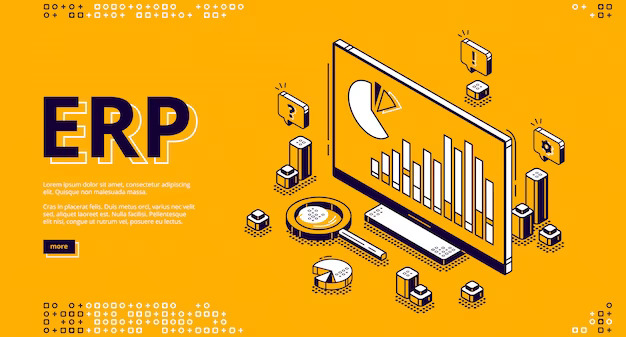Introduction
In the ever-evolving landscape of the manufacturing industry, businesses are continually seeking ways to enhance efficiency, streamline processes, and stay competitive. One powerful tool that has proven instrumental in achieving these goals is Enterprise Resource Planning (ERP) for the manufacturing industry. ERP systems are comprehensive software solutions designed to integrate and manage various aspects of a manufacturing business. In this article, we will explore the 10 key benefits of ERP for the manufacturing industry, including how ERP system integration plays a pivotal role in maximizing these advantages.
1) Enhanced Operational Efficiency
One of the primary benefits of ERP for the manufacturing industry is the substantial improvement in operational efficiency. ERP software integrates all core business processes, such as inventory management, production planning, and order tracking, into a unified platform. This integration eliminates redundant data entry and allows for real-time data access, resulting in faster decision-making and streamlined operations.
2) Improved Accuracy and Data Integrity
ERP systems are renowned for their ability to maintain data accuracy and integrity. With centralized data storage and standardized processes, the likelihood of errors is significantly reduced. This leads to better decision-making, as decisions are based on up-to-date and reliable information, ultimately resulting in improved product quality.
3) Optimal Resource Utilization
Effective resource management is crucial in the manufacturing industry. ERP for the manufacturing industry enables businesses to better allocate resources, including labor, materials, and equipment, based on real-time demand and capacity data. This ensures that resources are used efficiently, reducing waste and costs.
4) Inventory Optimization
Manufacturers often grapple with inventory management challenges, including overstocking or stockouts. ERP systems provide real-time visibility into inventory levels, demand forecasts, and supplier lead times. This enables businesses to optimize inventory levels, reduce carrying costs, and enhance overall supply chain management.
5) Streamlined Production Planning
ERP systems facilitate agile production planning by providing insights into production schedules, capacity constraints, and materials availability. Manufacturers can respond quickly to changing customer demands, minimize production bottlenecks, and optimize production processes to improve overall productivity.
6) Enhanced Product Traceability
In industries where product traceability is critical, such as food, pharmaceuticals, and aerospace, ERP systems shine. These systems track the entire production process, from raw materials to finished products, allowing for quick and accurate recall of products if quality issues arise, ensuring compliance with industry regulations.
7) Better Supplier Relationship Management
Effective supplier relationship management is essential for the manufacturing industry’s success. ERP software enables manufacturers to monitor supplier performance, manage contracts, and negotiate favorable terms. This helps in building strong, collaborative relationships with suppliers, ensuring a stable supply chain.
8) Cost Reduction
ERP for the manufacturing industry helps identify cost-saving opportunities by analyzing various aspects of the business, including materials, labor, and overhead. By streamlining operations, optimizing resource allocation, and reducing waste, ERP systems contribute significantly to cost reduction.
9) Enhanced Customer Satisfaction
Manufacturers that implement ERP systems can offer better customer service by providing accurate order tracking, shorter lead times, and quicker response to inquiries. Meeting customer demands promptly and accurately enhances customer satisfaction and can lead to repeat business and referrals.
10) Scalability and Growth
As manufacturing businesses evolve and expand, ERP systems can scale to accommodate growth seamlessly. Whether opening new facilities, entering new markets, or diversifying product lines, ERP software ensures that operations remain integrated and efficient, supporting long-term growth strategies.
ERP System Integration: Maximizing Benefits
ERP system integration is the cornerstone of reaping the full benefits of ERP for the manufacturing industry. Integrating the ERP system with other critical business applications, such as Customer Relationship Management (CRM) software, Human Resources Management (HRM) software, and Manufacturing Execution Systems (MES), enhances functionality and data sharing.
1) Streamlined Data Flow
ERP system integration ensures that data flows seamlessly between different departments and systems within an organization. This reduces data silos and minimizes the need for manual data entry, improving data accuracy and efficiency.
2) Real-Time Information
Integration allows for real-time access to critical information across the organization. Decision-makers can access up-to-the-minute data, enabling them to make informed choices swiftly.
3) Enhanced Collaboration
ERP system integration fosters collaboration among departments, as employees can easily share data and insights. Cross-functional teams can work together more effectively, leading to better decision-making and problem-solving.
4) Improved Reporting and Analytics
With integrated data, manufacturers can generate comprehensive reports and perform in-depth analytics to gain insights into performance, trends, and areas for improvement. This data-driven approach empowers businesses to make strategic decisions and optimize operations continually.
5) Regulatory Compliance
Integration ensures that data related to regulatory compliance, such as quality control, safety standards, and environmental regulations, is consistently and accurately recorded and reported. This reduces compliance risks and potential legal issues.
Conclusion
ERP for the manufacturing industry, coupled with ERP system integration, offers a multitude of benefits that can significantly enhance the competitiveness and efficiency of manufacturing businesses. From improved operational efficiency and resource utilization to better customer satisfaction and scalability, ERP systems empower manufacturers to navigate the complexities of the industry successfully. As technology continues to advance, embracing ERP solutions becomes increasingly vital for staying ahead in the fast-paced world of manufacturing. By leveraging ERP and integrating it seamlessly into your operations, your manufacturing business can thrive and adapt to the ever-changing demands of the industry.



